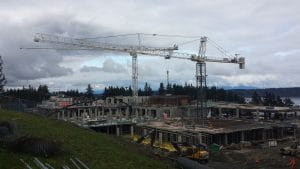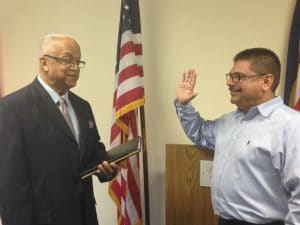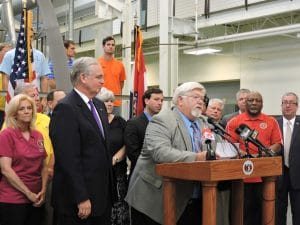
The project is expected to extend the useful life of the building for another 50 years and create 290 union jobs, many of which will be for the highly training SMART members who keep the energy efficiency market running.
The financing will also allow the building, which is restricted to tenants ages 62 and up, to continue to offer over half of its units to extremely-low income families who earn less than 30 percent of the area’s median income.
According to a press release from HIT, the two investments in Oregon have provided $31 million for union construction workers. A total of 1,140 total jobs have been created across industry segments, including approximately 510 union construction jobs.
Author: paul
CSX Transportation General Committee of Adjustment GO 851 has reached two new collective bargaining agreements with Florida East Coast Railway (FECR). One agreement covering conductors, engineers, and trainmen; a second covering yardmasters. Both five-year agreements were signed June 18, 2015, and are retroactive to 2013. Local 903 of Jacksonville, Fla., and Local 1138 of Miami are affected by the agreements.
The agreements were a long-time coming with the bargaining process having begun 2.5 years ago. The National Mediation Board (NMB) was invoked and NMB Mediator Victoria Gray stepped in to guide the mediation.
Both agreements protect work rules, wages, and healthcare for both train and engine members and yardmasters. The agreements include retroactive pay to 2013 with wage increases totaling 13 percent each.
“This was a team effort involving former Vice President Robert Kerley, Vice President John Lesniewski, Vice General Chairperson Joe Bennett, FECR Assistant General Chairperson Jim Bush (Local 903), Local Chairperson Jim McCorkle (Local 1138) and Local Chairperson Eddie Guillen (Local 1138),” GO 851 General Chairperson John Whitaker said.
FECR operates between Jacksonville, Fla., and Miami. GO 851 represents approximately 200 employees on the property.
Updated: July 20, 2015
The open enrollment period for the Long Term Disability (VLTD) Plan has been extended an additional 30 days. Transportation Division members will now have until September 30, 2015 to open enroll in the plan. Further policy details are being finalized and will be posted once available. Additional questions should be directed to your regional field supervisor (contacts) or to the VLTD hotline at (866)-753-3632.
Beginning June 29, 2015 through August 31, 2015 an open enrollment period will be available for Transportation Division members to enroll in the new Voluntary Long-Term Disability (VLTD) Plan.
Members will have two options for enrollment into the VLTD plan. For Rail members, Part “A” allows the member to purchase coverage to protect their income should they become disabled after a 238 day elimination period with a monthly benefit of 50% of salary to a maximum benefit of $7,000. Part “B” contains the same 238 day elimination period, but offers a monthly benefit of 60% of salary up to a maximum benefit of $7,000. For Bus members, Part “A” allows the member to purchase coverage to protect their income should they become disabled after a 365 day elimination period with a monthly benefit of 50% of salary to a maximum benefit of $6,000. Part “B” contains the same 365 day elimination period, but offers a monthly benefit of 60% of salary up to a maximum benefit of $6,000. Additionally, Rail or Bus members will have the option of combining one of the above options for the VLTD with the Short Term Disability (VSTD) plan or elect the VLTD plan on its own.
It is important to note that members who have previously opted out of the VSTD plan or you were previously denied coverage you are eligible to enroll with no pre-existing condition restrictions during this enrollment period.
For Members currently enrolled in the short-term disability plan (VSTD) and are not seeking coverage in the long-term disability plan (VLTD), no action is required at this time.
It is recommended that members review the detailed FAQs to gather more information on the plan offerings and eligibility requirements. Additional questions should be directed to your regional Field Supervisor (Contacts) or to the VLTD hotline at (866)-753-3632.
Rail VLTD FAQ
Rail VLTD Enrollment Form
Bus VLTD FAQ
Bus VLTD Enrollment Form
Former President Bill Clinton recently visited the Daily Show to about the Clinton Global Initiative, specifically noting the success of a joint program he used to partner with building trades unions such as SMART which invested in fund resources to create retrofitting jobs for union members.
In 2011, Clinton partnered with North America’s Building Trades Unions and the American Federation of Teachers, who collectively made a $10 billion pledge for just three years of work.
On The Daily Show, Clinton promoted the program as an example of “one that worked” for American workers. Here is video of the second part of Bill Clinton’s visit to the Daily Show, including his story about the Building Trades:
Clinton: They made a commitment that they would organize $10 billion in investments in building retrofits. Now, I was on President Obama’s council with all of these big business people and that’s more than they spent all together.
Clinton: In the first 5.6 billion they created 50,000 jobs and trained 900,000 people across America how to do this type of work.
Stewart: And these are good trade jobs? These are middle class jobs.
Clinton: Yeah, great jobs, and you know you can’t ship these jobs overseas because the buildings are here.
The White House on Thursday, June 4, endorsed a requirement that U.S. railroads install new safety equipment (Positive Train Control – PTC) by the end of 2015, despite bipartisan efforts in Congress to give passenger and freight rail companies extra time to comply.
Administration support for the deadline could lead to a showdown with lawmakers in Congress over the safety equipment known as positive train control, or PTC, which federal officials say would have prevented the deadly May 12 Amtrak derailment in Philadelphia that killed eight people and injured more than 200.
Republicans and Democrats have introduced different pieces of legislation to extend the deadline. A measure giving railroads until the end of 2020 to comply with the safety requirement was approved by the Senate Commerce Committee in March and moved to the Senate floor for a vote.

The set of groundbreaking new rules are part of a legislative package earmarking $130 billion for infrastructure over the coming decade. SMART was a part of the coalition of labor and community groups that lobbied for these requirements, which will provide new work opportunities for journeymen and apprentices on Ontario projects.
While widely used in the United States, Project Labor Agreements are rare in Canada. Also known as Community Benefit Agreements (CBAs) they were used on the construction of the Olympic Village in Vancouver and the revitalization of Toronto’s Regent Park. In both cases, they were used to help and make inroads into the fast growing and diverse neighborhoods in both of those two cities.
On Thursday, June 4, Missouri Governor Jay Nixon traveled to SMART SM Local 36 in St. Louis to veto a toxic right-to-work for less bill passed by that state’s legislature. With a fired up crowd of hundreds of onlookers, he noted that “For generations, the ability of workers to join together and bargain collectively for fair wages and benefits has formed the foundation of the American middle-class. This extreme measure would take our state backward.”
Due to the Republican Party’s lock on midterm elections, this year marks the first time that anti-worker groups were able to foster enough support in the state Legislature to send a bill to the Governor. The Legislature effectively shut down the last week of it’s session after some GOP senators forced a vote on the measure.
Even with an overwhelming and record number of Republicans in the Missouri House and Senate, the bill’s original passage still fell short of the two-thirds majority vote needed in both chambers to overturn Governor Nixon’s veto. The Republican Party was split, with many members joining Democrats in opposition to the extreme legislation.
To override the veto, the Republican-controlled Legislature would need 23 votes in the Senate and 109 in the House. The Senate passed the measure 21-13 earlier this year while the House passed it 92-66.

We need to let Congress know we’ve got the facts and we don’t support Fast Track. In the past, deals that were passed using the Fast Track process deepened our trade deficit, weakened our manufacturing sector, pushed wages down and increased the 1%’s control on our economy.
More of these bad policies will shrink our paychecks and stifle middle class growth. Not only does Fast Track encourage the passage of bad trade deals, but it will also tie the hands of local and federal lawmakers and prevent them from improving bad deals or telling the negotiators the
deal won’t get a vote unless they go back to the drawing board. We deserve better than a policy that limits Congress to a simple up or down vote on trade deals that will affect working families.
I believe that we can win this, but we have to act now.
Click here to contact your representative now and tell him or her to stand up for workers and democracy by opposing Fast Track when it comes up for a vote.
Call Congress today to #StopFastTrack: 1-855-712-8441

The lawsuit, filed by the Associated Builders and Contractors, (ABC) was an attempt to stop recent NLRB rule changes that would speed up union representation elections for workers and update agency activities to take advantage of changes in technology. For example, one of the highlights of the bill was a new rule actually allowing the use of email to transmit election forms.
The other lawsuit sits in front of another court in Washington, DC. The Texas case was considered the stronger of the two cases for anti-union forces.
Click here to view a copy of the case.

Former General Chairman James A. Williams had made it no secret that his retirement was imminent. He had announced at union meetings last year that these would be his last contract negotiations. A few weeks ago, Mr. Williams made the decision to quietly announce his plans to retire so that he may get the union affairs in order before his departure. A meeting and a vote was called for Friday, May 29 at the union offices in Irwindale, CA.
Although one of the newest Local Chairman for the General Committee, Mr. Gudino was found to be more than qualified to hold the office of General Chairman by a majority of the committee. Mr. Gudino began his career as a bus operator in 1986 and also served as a Gold Line Rail Operator starting in 2000. As an officer of the committee Mr. Gudino has served as Treasurer, Secretary Local Committee of Adjustment, Vice Local Chairman and Local Chairman for Local 1565. This resume gives Mr. Gudino the depth and breadth of knowledge and experience needed to lead a union that represents the over 5000 members of SMART and operators for the Los Angeles County Metropolitan Transportation Authority. As soon as they received the news, General President of SMART John Sellers and SMART Transportation Division President John Previsich called the General Committee to congratulate both Mr. Gudino and Mr. Williams.
Two other positions were also voted on at the meeting. 1608 Local Chairman John Ellis maintained his position as Vice General Chairman and 1607 Local Chairman Gilbert Camacho was elected as Secretary for the General Committee of Adjustment.


